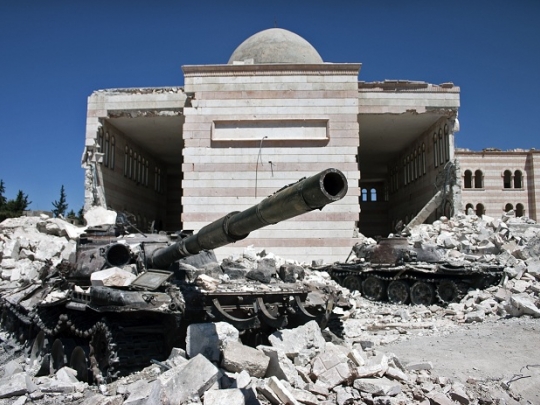Six Billion Dollars Spent Fighting ISIS, 50,000 Bombs Dropped on Iraq and Syria, Is The ISIS “Losing Ground”?

After two years of bombing, the U.S. recently marked a horrendous milestone in a war with no clear end in sight.
Vocativ reported that the American-led coalition in the Middle East has now dropped 50,000 bombs in the ongoing campaign against Daesh (an Arabic acronym for the terrorist group commonly known as ISIS or ISIL in the West) that began in August 2014.
The analysis noted that bombing has increased with time, peaking in June when coalition forces dropped 3,167 bombs on Iraq and Syria.
“By comparison, U.S.-led forces in Afghanistan have dropped just over 16,000 bombs in the last six years, military data shows,” Shane Dixon Kavanaugh, a senior writer for Vocativ, wrote on Tuesday.
Although reports suggest Daesh is losing to ground forces in the region, the conflict still has no clear end in sight. And despite U.S. government denials, Kavanaugh reported it’s become increasingly clear that civilians are frequently killed by bombs dropped by the U.S. and coalition forces:
“Airwars estimates that at least 1,422 civilians have been killed by weapons deployed by coalition warplanes through July 18, a figure far greater than the 41 civilian deaths acknowledged by the Pentagon to-date.”
“U.S. and coalition airstrikes against the northern Syrian villages of Tokhar and Hoshariyeh have killed at least 56 civilians, including 11 children, according to the Syrian Observatory for Human Rights. Other groups claimed the civilian toll was as high as 200.”
“The Pentagon rarely accounts for civilians killed in airstrikes in Iraq and Syria, occasionally issuing statements with dramatic undercounts of the number of civilians they’ve killed since the war began,” Ditz noted. “U.S. attacks in and around Manbij alone have killed over 150 people in the past two months.”
In addition to the loss of human lives, the ongoing war on Daesh has a high financial toll. On Tuesday, Daniel McAdams, executive director of the Ron Paul Institute for Peace and Prosperity, wrote,
“With each bomb costing on average somewhere around $50,000, those bombs have cost U.S. (for the most part) taxpayers at least two and a half billion dollars.”
And in February, The Hill reported that the cost of the war had already surpassed $6 billion by the end of January.
“A defense spokesman says that, as of January 31, the total cost to U.S. taxpayers of anti-ISIS operations that began on Aug. 8, 2014, is $6.2 billion,” reported Kristina Wong, defense reporter for The Hill.
“That’s an average of $11.5 million per day, for 542 days of operations. The average daily cost of operations has gone up from $11.4 million per day, as of late December.”
Since the real goal for this war has more to do with controlling the region’s energy resources and overthrowing Syrian President Bashar Assad than actually defeating Daesh, McAdams noted that profits for the military-industrial complex will continue to roll in even after the bombing finally ceases.
“Imagine how much damage to infrastructure, environment, etc. will have been done by 50,000 bombs,” he wrote. “The U.S. taxpayers will pay once to blow the place up and then pay again to build it back up.”
So, more than 50,000 bombs later, are the U.S. and coalition forces any closer to eradicating Daesh? Official government sources under-report civilian death tolls, and the number of Daesh fighters killed so far is even harder to calculate, with the Pentagon and other official sources offering conflicting, biased reporting.
In October, The Atlantic’s Kathy Gilsinan reported that the U.S. military claimed it had killed 20,000 Daesh fighters in about a year. “Somehow, though, ISIS’s ‘overall force’ is the same size as it was when the U.S. air campaign expanded into Syria over a year ago,” she wrote.
Gilsinan argued that this inaccurate body count could help extend the war indefinitely, concluding:
“And if the United States can’t know when it has won—or lost—it can’t know when the killing will stop. Nor, apparently, exactly how much it has already done.”
- Source : Kit O'Connell















